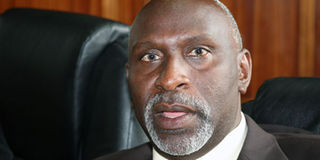MPs clash with CIC over nominations

The chairman of the Commission for the Implementation of the Constitution Charles Nyachae. MPs on the Finance Committee clashed with the CIC over the latter’s mandate in relation to the nominations under debate February 9, 2010. FILE
MPs on the Finance Committee have clashed with members of the Commission for the Implementation of the Constitution over the latter’s mandate in relation to the nominations under debate.
The confrontation arose after MPs questioned the Commission's presentation led by Mr Charles Nyachae, who they accused of shirking their responsibility by only referring to the Constitution.
In their presentation, the Commission argued that it was necessary for President Kibaki and Prime Minister Raila Odinga to involve the Judicial Service Commission in the nomination of the Chief Justice.
They told the team, which is scrutinising the nomination of William Kirwa as the Controller of Budget, that they were preparing to start a series of meetings with the JSC when the President made the nominations.
Mr Nyachae also gave an account of the Commission’s activities after the controversial nominations, which culminated in a press statement terming it unconstitutional.
He said the Commission later held separate meetings with the two Principals, where each side offered their accounts of events leading up to the announcement of the nominations on January 28.
He said the appointment of the Chief Justice should have started with a recommendation by the JSC and then followed by consultation between the Principals.
The Principals would then nominate the CJ, forward the name to Parliament for vetting and possible approval, with the President then making the appointment.
On the Attorney General, Director of Public Prosecutions and the Controller of Budget, the PM and the President should have consulted before nominating the candidates for approval by Parliament.
Mr Nyachae said the Commission would only move to court to stop the process if Parliament was to approve the list, which would give the President the green light to make the appointments.
But committee chairman Chris Okemo and MPs Jakoyo Midiwo, Musikari Kombo and Ntoithia M’Mithiaru were not satisfied with the Commission’s presentation, and demanded that it takes a firm stand.
“I think we are here because you have not done your job. PNU and ODM are wrangling because you have not done your job. You can’t just quote the Constitution, which we can also read,” said Mr Midiwo.
“We have had problems in this country because people who serve in constitutional offices shy away and serve the king. You’re afraid to tell the king he is naked,” said Mr Kombo.
Said Mr Okemo: “We’re crying out for you to help solve this crisis. You’re independent. Come out with courage and give us an opinion.”
But the Commission declined to do as the MPs wished, insisting that it is up to Parliament to make laws, the Judiciary to interpret them and the Executive to implement them.
Mr Nyachae insisted the Commission’s work is to “monitor, coordinate, oversee and facilitate” the implementation of the Constitution, and acting otherwise would be in breach of their mandate.
“We won’t cede any part of our mandate, we will not shirk it, and we will not take a mandate given to us,” Mr Nyachae told the committee.
The CIC members also declined to state whether the consultations between the two Principals would have been viewed as sufficient.
According to Elizabeth Muli, the commission’s vice chairman, the two Principals’ refusal to involve the JSC as required in Article 166 of the Constitution meant any nominations would be futile.
“Even if, for example, we had consultations, and a tomato seller was appointed Chief Justice, would we say that we have met the letter and spirit of the Constitution?” she asked.
Commission member Imaana Laibuta asked the committee members to make their decisions based on the information presented to them.
Later, the Law Society of Kenya said the involvement of the JSC was not required, and that consultation between the two Principals did not necessarily imply their agreement.
“For the integrity of those institutions, the process needs to be advertised and the positions advertised,” said LSK council member Ochieng Opiyo.
Claris Oganga and Christine Kung’u, who made the presentation on the Federation of Women Lawyers, told the committee they opposed the nominations mainly because no woman was appointed.
The National Muslim Leaders Forum said the nominations were unconstitutional as they did not conform with “transparency, citizen participation, gender, regional and ethnic balance".
Namlef chairman Abdullahi Abdi said the process is now flawed beyond repair and needs to be restarted afresh.




